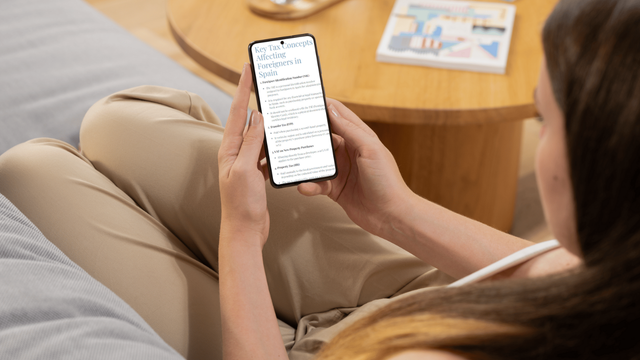We’ve compiled all the steps involved in a must-read (and must-keep!) guide.
Thinking about buying or selling a property in sunny Spain?
Pre-contracts:
When selling a home prior to the public deed being signed, a private contract – known as pre-contract – is generally signed between the seller and the buyer.
This is not a mandatory contract although it is always done when the sale is through a developer, and commonly among individuals – especially in larger metropolitan areas – to guarantee the operation.
The Law considers this private document a perfectly valid way of formalising a business.
This means that if you sign a pre-contract you will be legally bound to comply with all its contents, provided these are not contrary to the Law.
Therefore, you will not be exempted from compliance on the grounds that whatever was agreed at the time is no longer convenient, or that you were unsure about what you were signing.
Hence the importance of getting the proper legal advice before signing a document of this nature and ensuring that you don’t sign anything that you don’t understand 100% or you’re not fully convinced about.
Who is the signatory of the selling party?
When a developer sells a property, the document is generally signed by the administrator or attorney in fact or agent of the company and, failing that, the developer him/herself.
If it is a transaction between individuals, the document must be signed by all the owners, either personally or suitably represented by empowered persons.
If a home is shared between husband and wife, both parties will have to sign it.
They will also have to do so if the house is privative of one of them (it is not profit), provided that the home being sold is the effective marital domicile of the selling couple.
If the seller has given power of attorney to another person to sign that document, the attorney must present the notarised authorised copy – not just a photocopy -, and the power of attorney must authorise it for sale. That’s why we recommend verifying – by reading the deed of power -, that the attorney is authorised to formalise the sale.
If the heirs of a deceased owner intend to sell the home, it’s important to ensure that all documents are in order and that they are the only ones with rights over it.
Debts associated to the property
It’s very important to check whether or not the property is free of any debts – whether there’s a mortgage or the property has been seized. You can request this information from the corresponding Property Registry.
Often there will be a mortgage involved. In this case, the buyer will have to assess whether to subrogate or not. In other words, the buyer will have to decide whether it accepts it and becomes a debtor of the part that remains to be paid to the bank that granted it or whether it gets his/her own mortgage loan.
In the first scenario, it’s very important to find out all terms and conditions of the previous mortgage, especially the interest rate – is there a minimum and a maximum? what is the repayment term? what are the commissions agreed? what are the amounts that remain to be paid?
The easiest way to go about it will be to get advice from experts. For more information, visit mortgage-spain.
Community fees
If the property is located within a community of owners, the corresponding fee will have to be paid periodically.
It’s important to check that there are no outstanding payments and if there are, how late are they. You can request this information from the president or the community administrator, who can also inform you about the statutes or internal regulations of the building.
It is also advisable to find out if there are community-approved expenses, how much are they and how often they need to be paid.
If the buyer intends to modify the property s/he purchases – for instance, turning a commercial property into a residential home or vice versa or converting the house into a tourist apartment, or carrying out a certain activity – s/he must first inform the city council to find out if that’s at all possible and obtain the appropriate license, and later get the authorisation of the community of owners and find out if there are any statutes that might oppose his/her project.
Price and deposit
The pre-contract will include the price of the property as well as the amount to be deferred and how this will be paid – either in successive payments and the granting of the public deed, or by subrogating it in the mortgage.
It is customary in the pre-contract to establish the amount the buyer will pay the seller as a deposit – which, will depend on the actual price of the property.
The most common types of deposits are known as “penitential deposits”. In this case, the buyer loses the deposit if the contract is not fulfilled because of him/her. If the seller defaults, s/he must return them duplicated.
Expenses incurred in buying and selling a property in Spain
There are five different type of expenses derived from the sale:
- The Municipal Tax on the Increase in the Value of Urban Land (commonly called Municipal Capital Gain Tax).
- Public deed at the notary.
- Registration in the Property Registry.
- Taxes (formerly called Royal Rights).
- Administrative charges – the invoice charged by the notary public to conduct certain procedures.
If nothing is agreed in the private contract – or if it is stated that the expenses are ‘according to Law‘ -, the selling party will pay the surplus value, and most of the original deed while the buyer will pay the copies of the deed – please bear in mind that this rule differs in each Autonomous Community -, registration fees, and transmission taxes.
The agreement by which the taxable person of the Municipal Goodwill Tax (the seller) or the real rights tax (the buyer) does not affect the Administration, which will always claim these taxes to the taxable person.
As far as the Land Value Tax (Impuesto de Bienes Inmuebles in Spanish) of the year in course, the STS of June 15, 2016 states that in the absence of an agreement to the contrary, the seller who pays the Land Value Tax may pass it on to the buyer in proportion to the time that each of the parties have held ownership and for as long as it is.
In the event that the seller is a real estate developer, it is prohibited by legislation for the buyer to assume the expenses that by law must be paid by the selling party, such as the municipal capital gain, the expenses of the declaration of new construction and of the horizontal division, or those for the cancellation of the mortgage that exists on the house, (when it is to be acquired free of charge or it is preferred to hire one’s own).
Election of the notary
All notaries are impartial, but you may be interested in going to a specific professional to formalise the public deed.
Regardless of who is selling the property – whether it’s a real estate developer or an individual – the buyer has the right to choose a notary.
Effects of the private document
Although the private document is fully valid, it’s not enough to register the home, nor to request a mortgage from the bank.
For this reason, it is essential to have a document with greater effects that provides enough legal certainty required by the system. This document is the notarial public deed.
Purchasing a home is one of the most important investments in a person’s life, so it’s extremely important for anyone thinking about buying a home in Spain (or anywhere else for that matter!) to seek professional legal advice before proceeding with any of the paperwork involved in the purchase.
The current Spanish system is based on a close collaboration between the Notary and the Land Registry. This provides maximum legal certainty for buyers and sellers.
However, advice should be sought before the signing of any document or receipt, and even before the delivery of any money, even in the form of a deposit.
If this process overwhelms you and you’d like the certainty to know that you are not doing something that will come back to bite you later, talk to us.
We’ll be glad to advise you on all the steps that must be taken to acquire a home in Spain with maximum guarantees.
If you want to learn more download our free guides or contact us.





